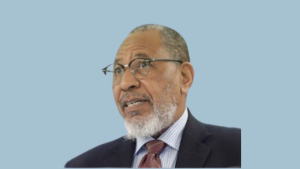“If we get our policy, politics, and institutions right, African economies and society could gain greater energy and food security, built on green competition and taking strong action on climate change.“ —Professor Chuks Okereke, Director of the Centre for Climate Change and Development at Alex Ekwueme Federal University
Professor Chuks Okereke, Director of the Centre for Climate Change and Development at Alex Ekwueme Federal University, Ebony State, Nigeria, argues that crisis offers African leaders a moment for deep thinking, which could lead to transformational change. But old politics, and short-term problem-solving are getting in the way of achieving such changes.
Professor Chukwumerije Okereke is Director of the Centre for Climate Change and Development at Alex Ekwueme Federal University, Ebony State, Nigeria. He is a Professor of Global Governance and Public Policy at University of Bristol and Visiting Professor at the London School of Economics, UK. His specialism is climate justice, corporate climate strategies and green economy transition in Africa. He was Lead Author for the IPCC AR5 and IPCC special report on 1.5; and Coordinating Lead Author (CLA) of Chapter One for the IPCC Sixth Assessment Cycle (AR6) Working Group III. Prof. Chuks Okereke is a member of the Earth System Governance Scientific Steering Committee, and co-chair with IDDRI of the UKAMA platform.
We’ve been facing a poly-crisis caused by one disruption after another – COVID, climate, conflict, debt… Can you see something positive in this, in terms of reframing the choices open to African countries, forcing them to say hey – this isn’t working, we have to do things differently? How do you see the global picture, and the choices facing African countries where you’ve been working, especially Nigeria?
It’s a great question. I have often heard people say that the worst thing you should do with a big crisis is to waste it. Crisis can offer opportunity for reflection, for deep thinking, for transformational change. But it is not a given that a crisis does in fact bring these rewards. There is an Ibo adage that goes - we generally grow up knowing that experience is a great teacher, but actually it’s what you do with such experience that matters. We have many crises happening at the same time – climate, COVID, biodiversity, the war, debt mounting. All of these present opportunities for African countries to sit back and reflect. Good reflection should highlight that it is just not sustainable to lurch from one crisis to another.
Some of the points for reflection for African leaders include: What do these crises reveal about the position of Africa in the global political economy, and the challenges facing the continent? What do they say about the institutional arrangements we should put in place to enable us to be proactive instead of just reacting once the crisis has hit? Why is it that Africans seem to be the most affected by these crises, even when they happen in far away countries? For example, the Ukraine war showed the vulnerability of African countries to imports of grain from that region. Why is it that we don’t have food sovereignty in Africa, why can’t we feed our own people despite having huge abondance of land? The COVID crisis and the associated debts had deep and wide-ranging economic consequences. Why is it that, unlike India, we cannot produce and assemble generic drugs? Given the climate crisis and energy security – why can’t we leverage our incredible resources to achieve sustainable energy security? Look at our wind, geothermal, and solar resources. What are the key impediments which need to be removed? What are the innovation systems that need to be built? What policies and fiscal reforms should we be putting in place? These are the vital questions which this crisis should surface. But I am sad that African governments are not thinking about it in this way. There may be pockets of exception here and there. But overall, we see old politics, and reactionary mind-sets focused on short-term problem-solving, not long-term thinking for transformational outcomes. I fear this poly-crisis may indeed be wasted.
In terms of industrialisation, this has been a topic on the agenda for individual countries and the African Union for decades. Yet levels of industrialisation have plateaued or possibly decreased, as bits of manufacturing have been put out of business by cheaper goods from Asian tigers. Can industrialisation offer an agenda which works for individual countries like Nigeria, given its scale? Nigeria is clearly in a very different position to, say, Togo or Chad. Should it be a national strategy or more of a continental project?
It has to be both, and actions at each level can be mutually reinforcing. You have to start with a clear analysis of your comparative advantage, the things you can do by yourself and where your strengths lie. And then identify what needs collaboration from others. The challenge is we have not learned to step back and think long-term in ways which transcend everyday political actions. I know that many African countries now have vision 2030, vision, 2040 and vision 2050 documents, but there is often a huge disconnect between the vision statements, and everyday politics. Everyday political actions are driven by short-term interests, electoral and political gains, they are not welded to any long-term strategic vision. Another big gap is that many African countries do not have a clear framework for monitoring, evaluating and measuring themselves against the vision they set out for themselves.
There is a lot which international collaboration can provide for Africans in their quest for green industrialization but the fundamental impetus has to come from the national interest. I teach International Relations at the University and I tell my students that while COP28 can achieve a certain amount, it has essentially a catalytic role. There can be great texts and agreements that send policy signals. But, in the end, they will amount to little unless individual nations push ahead domestically. So also with industrialisation, the push has to come from individual countries. Take for example my country Nigeria. There is a need for the government to be thinking long term, such as what will be the consequence of a big drop in demand for Nigeria’s oil and our export revenue? What will be the consequence of 30-50% crop yield losses, as predicted by some models from climate change impacts? What are the 3-4 areas in which Nigeria can build its expertise and a strong presence in the green economy by 2030, 2035? There is a tendency for us to be a consumption country. We don’t think much about production. We have a total population of about 200mn people and yet we import almost everything, from toothpicks and toothpaste to high quality technological materials. This is one of the reasons we are very vulnerable to the poly-crisis; since we rely on imports for so much of what we consume. Any significant disruption in the international trade system can bring things to a halt.
Nigeria has the potential, an obligation really, to bring together the economies of West Africa, and Africa as a whole, to see how we can unlock the great green industrial potential of the continent. Some of the conversations around this would best benefit Africa if held as a group. I don’t imagine DRC or Namibia can individually get much from China, or the EU, whether on mining of critical minerals or hydrogen. But if Africa negotiates as a bloc, as a one group, they stand a much better chance of capturing more value.
We should be thinking about setting up certain industrial plants which Africa could invest in collectively, such as basic refining facilities for certain minerals. Let’s take a cluster of countries, and site the refining in particular locations, not necessarily in the place where the minerals come from. This would certainly be better than having the refining done in China, Japan or Europe. There are a number of sectors where this could work, with several regional blocs working together. Nigeria should think hard about the green economy, green industrialisation, and how to mobilise other countries to negotiate as a group. One of our challenges in Africa is that it’s often easier to fly via Paris or London than take a direct flight to your next-door neighbour. If we want trade integration, we need better connections to create the bigger market we need across the continent. Nigeria can play an important role in championing this.
What got you started with green economy, green transition?
I have been in this field for a very long time, for longer than I can remember. My PhD was on climate justice and international climate cooperation. The motivation was simple. I saw that this big crisis was also a big opportunity. I saw that if African countries do not take action, if we don’t prioritise climate justice, then climate change will aggravate poverty and inequality within Africa and globally. I could also see that there was an opportunity here to address poverty and inequality through a more collaborative way of addressing climate change. There are negative and positive dimensions to the green economy and climate. If we don’t go the green route, Africa will be losing value and bearing the brunt. But if we get it right – the policy, the politics, our institutions – it’s entirely plausible to see African economies and society gaining greater energy and food security, built on green competition and taking strong action on climate change.
If you look at the EU’s Green Deal and measures such as the Carbon Border Adjustment Mechanism (CBAM), do they represent a hurdle for Africa? Or can they help speed up the green transition?
The international regime can offer catalytic opportunities for collaboration, but countries and regions have to seize these and implement the actions needed. At one level, I am sympathetic to the EU and its Green Deal. It is ambitious. But it inevitably thinks from the EU point of view, which is completely understandable. Sometimes I wish they respected, listened and thought about the consequences of their policies and initiatives for other parts of the world, particularly Africa. They need more attention to our geographical proximity, so they can carry African governments a bit more along. It would have been good to have some sessions together to explore the likely impacts of the Green Deal, and how to achieve its objectives without imposing more constraints on Africa’s development. I get the sense that international economic justice is not uppermost in the minds of the Europeans when they are thinking through policies like the Green Deal. It has been shown that with CBAM Africa will lose a lot of export revenue, as shown by a new report from the Africa Climate Foundation and LSE which paints a bleak picture of impacts on Africa from this unilateral trade measure. This really should not be the way to go, if Africa is already bearing the brunt of climate change having contributed the least.
Equally, look at the EU’s deforestation policy, which has many good intentions for forest certification, and is intended to help ensure that EU consumption does not contribute to deforestation in Africa. But people in Ghana, especially smallholder farmers, are crying that now they face an extra level of reporting and verification. I read an analysis somewhere that in the 1970s, the average smallholder farmer in Ghana got 50-60% of the value of chocolate prices for their cocoa. Now, fifty years later, its only 10-20%. It’s a huge loss of revenue to these farmers and now we are imposing yet more unilateral measures designed to do the right thing for Europe, but which have major consequences for African farmers. African governments are keen to increase exports of timber, cocoa and other forest-based produce, to pay down their rising debts, but must now deal with these new trade measures imposed on them. The same may be said of CBAM and other elements of the EU Green Deal. I don’t begrudge the EU’s desire to speed ahead, but they must recognise and think about the negative consequences of their green policies for African producers and economies.
One big hope from green industrialisation and green transition has been pinned to green hydrogen. There have been a number of MoUs signed between different EU countries and Namibia, Mauritania and others. What have you seen that gives you confidence of the role green hydrogen could play as the great energy source of the future?
Nothing which inspires confidence, to be honest. What I have seen rather raises a lot of questions. One positive aspect is the way some African countries – such as Egypt and Namibia – have come together to collaborate, which shows some level of proactivity, and a willingness to exchange ideas and best practices. Africa is often rightly criticised for not being proactive, so we can celebrate the role Namibia is playing regarding green hydrogen. But that is where it stops. When it comes to the deals emerging from these discussions, we still see the foreign partners - the EU - dictating the terms of the contracts for green hydrogen. Just look at the choice of locations, which lie along the corridors of trade routes, which will just perpetuate export-oriented practices, as we have seen with mining. Some of this green hydrogen development is happening in defiance of national voices, who question who benefits from these deals. We do not see any emphasis on domestic energy challenges within African countries, it’s all about prospecting for cheap resources from Africa to solve Europe’s energy needs. If you want to add more value to green hydrogen, there are things which need to happen, such as building institutions, and the right fiscal policy. This big jump into hydrogen looks like an easy way out, but it won’t solve Africa’s fundamental challenges.
As you can tell, I am not as enthusiastic as many others about green hydrogen, less for technical reasons and more because the socio-economic and governance terms don’t seem right. There are some green hydrogen proposals which look very flimsy, so we need to ensure better balance in the contracts, so a greater percentage of this resource is kept within Africa to resolve the continent’s energy needs.
Might it work for green hydrogen to be used as a low carbon fuel to help establish steel, cement, fertiliser – all these highly energy intensive industrial outputs?
Yes - that’s the kind of associated development which I have in mind. We need green hydrogen as a means to achieve bigger ends, rather than it just being another commodity, something you put in the cargo-hold for selling overseas. This is the conversation which should be had. I am similarly keen on having a conversation about Africa’s gas. The energy transition in Africa needs to be phased, in a series of stages, with gas continuing to play a role for some time. Having said that, Africans need to be able to show that we won’t be wedded to fossil fuels forever, it’s a transitional stage. Governments should say - I want to use my gas in the near future to catalyse a range of industrial transformations, and then see it taper-off. These are the conversations we should be having, but we don’t hear these debates much at all. Instead, the conversations are very simple, offering binary choices – gas, or no gas. We need to think about gas in a more sophisticated way.
What about the case of Nigeria’s Energy Transition Plan? They have set a goal of carbon neutrality by 2060. How do you see this – is it feasible? Are they dealing with a phased approach to gas?
I am afraid, to a large extent, Nigeria’s Energy Transition Plan is just a document, with very little engagement from government. I am tempted to think that when some African countries write these plans, it is not because they feel a real need, but because they see it is demanded by the international community and as a reporting requirement. As a consequence, these reports don’t get picked up by the government, and they don’t drive the country’s economic planning and strategy. Take Nigeria’s Energy Transition Plan, which is committed to net zero by 2060, and compare it with the fuel subsidy removal which some saw as a really bold policy initiative. There has been little or no link between removal of fossil fuel subsidies and the energy transition plan. No-one has said the reason why we have removed these subsidies is so that we can generate the revenue which will allow us to invest in tripling of renewable energy, from solar panels. And we cannot carry on paying this money for subsidies every month, with some lining their pockets. We have to remove the subsidies, and then find a way of helping the most vulnerable. The fossil fuel subsidy removal has been seen entirely as a fiscal challenge, not born out of a desire to move from a high to low fossil fuel economy, nor has the government seen this as a good way to get income to fuel the green economy.
The main strategy of the Nigerian government is seen in the Petroleum Industry Act (PIA), which plans to increase fossil fuel production from 2mn to 3mn barrels a day. But we also have the government’s Nationally Determined Contributions (NDC), the Long-Term Low Emissions Development Strategy (LTS) and the Energy Transition Plan (ETP). You don’t have to be a genius to recognise there is no coherence between these plans. People in the environment ministry are touting their ETP, while those in the economics ministry are using their PIA. You and I know which will win and which will lose when push comes to shove. The push behind design of the ETP was largely external. But once it had secured the commitment of a few highly influential people like then Vice-President Osinbajo, someone should have come in to say: “OK, great. What do you need to get you on track?” This announcement should have been used to turbocharge the transition. Instead, the international community felt the ETP report was just a means for Nigeria to justify continued burning of gas – they saw it just as a game to get more money. Implementation has failed woefully and caused a lot of bad blood and angst. And this was made worse because, just after the ETP launch, when the Ukraine-Russia war started, the Europeans who had been saying “no, we won’t give you any investment for gas” were the same people who were now coming to Nigeria looking for more gas. This behaviour created a sense of distrust. Then President Buhari chose not to go to COP27 at Sharm el-Sheikh, but instead wrote a strong OpEd accusing Europe of hypocrisy.
I wouldn’t say Nigeria was doing nothing to implement the ETP. When it serves them, they can refer to it, but it’s not the fundamental driver for economic strategy. For government, the things that count are liberalising trade, getting more oil, getting more gas, and fiscal reforms. We have been trying to show them that, even if your main interests are economic growth, you can still do this in a way which is sensitive to climate imperatives. There is always some room to influence what they say because they have to turn up to the G20, to climate week, to COP, etcetera so you can help with the speeches and insert a few clauses. Once they have said it, they may think a bit harder about how to make it happen.
Given the falling price of solar panels, and volatile prices for oil, are ordinary people seeing the benefits of moving from diesel generators to solar? Is this shift visible in Nigeria today?
People are certainly thinking about alternative energy supplies, not from a low carbon perspective but from the everyday imperative of diesel costing more than 900 Naira/litre, which makes people think hard about other ways of getting energy. That’s why it was such a missed opportunity to link the announcement of cuts to the fossil fuel subsidy with, for example, a cut in duty on solar panels. The government could have said – “Look! There’s an opportunity here.” We should have seen money going into power research in this area, a proper plan to manufacture solar panels, and provide lots of other incentives. That’s what you call “joined-up policy”. I think a lot more people would be willing to switch to solar panels now following the removal of subsidies.








